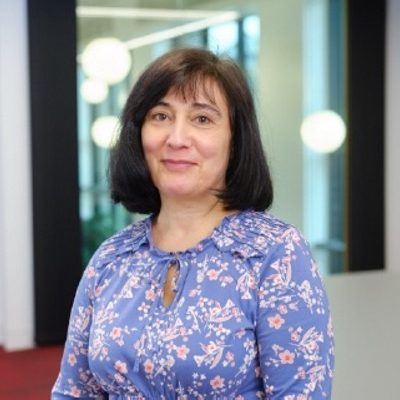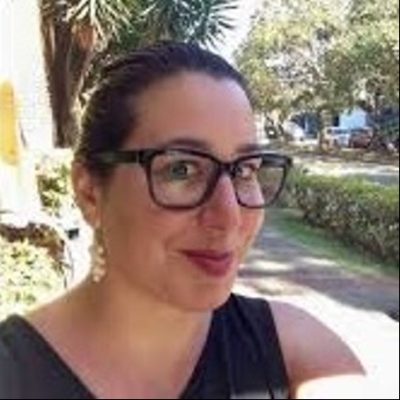Chapter 11 – Doing what it says on the tin, online: the Workshop module for Open Education practitioners
Professor Chrissi Nerantzi and Dr Javiera Atenas
Context
This case study reports on the Workshop module for Open Education practitioners that was offered online during 2020-2021 as part of the new Masters in Open Educational Leadership at the University Nova Gorica. The module had a cohort of four students who were professionals and open educators from Europe and Africa.
We describe how this practical module was designed and implemented by two academic developers to enable deep and meaningful hands-on engagement via digitally networked platforms, aiming at empowering students to learn about open practices, resources, communities, policies and data, by experiencing it themselves, while developing agency to transform their professional practice. We reflect on our experience as academics teaching this practical module.
Intervention
The module was structured in a way that created a scaffold for peer-to-peer learning, taking students on a journey through a practical project-based learning model. Our pedagogical approach was evidence-informed and characterised by providing tutor support, using learning activities, choice and creating a learning community (Nerantzi, 2017). Our aim was to create multiple opportunities to actively engage students in the learning process, by experimenting and sharing their ideas with us and their peers. Students worked on their own contextual open education projects which formed the basis of their assessment (portfolio and professional discussion). These projects were authentic, leading to a life beyond the module as they would be implemented. It was important to us to enable peer-to-peer exchanges from early on to sustain and grow peer relationships so that students didn’t develop dependency on tutor support. Instead, students felt part of a learning community that included them and others beyond the boundaries of the module. This boosted motivation and peer learning. Recent research has shown, especially during the pandemic, that students often missed working with their peers and felt lonely and disconnected from their peers (Dunbar-Morris et al., 2021). This did not reflect the experience of students on the Workshop module, in contrary, students felt connected and were actively working with their peers throughout the module.
Live sessions
We organised five live sessions (Introducing, Exploring, Designing, Testing, Evaluating) using the institutional VLE (virtual learning environment). These were themed around the key areas we wanted our students to develop capacity and capabilities in through their work on authentic open education projects. Our approach was transparent. We showed them how we developed the open learning materials from the outset using a collaborative drive. The resources were enriched further with their input and our guests’ contributions. We enabled critical conversations, debates and engaged students in project-based learning even during the live sessions. The scaffold we had put in place aimed to foster active and dynamic participation throughout, learning through practical application, making and collaboration where students pursued their own interests and supported each other (Nerantzi & Atenas, 2021). The sessions (S1-S5) were sequential and provided a platform to grow, to manage students’ projects, and to work on the assessment progressively.
In S1 Introducing, we focused on laying the foundations of a learning community to form through using a creative activity with objects in a jar from their past, present and future. This activity helped students feel relaxed, open up and get to know each other. We participated in this activity so that students could see our human side and get to know us a little bit better as well which we felt was important. We moved on to re-define open education and its potential impact, and the students defined the problem they wanted to solve using a NESTA tool; this step helped them identify, through the use of evidence, underlying issues, reviewing who is affected by it and cultural factors in play. They could then work on a problem which was reformulated after discussing it with their peers. In S2 Exploring, we analysed how openness, as a broad concept, enabled them to solve the problems posed, so they started drafting ideas from a sustainable-development perspective. In S1 and S2 students appreciated the opportunity to express what openness meant to them, thus, embracing those definitions in their personal practice; they also valued the activity of defining a problem, as they mentioned that the exercise of defining it, reviewing an issue from different angles and seeing different approaches was new to them. In S3 Designing, a guest expert in learning-design shared his experience in designing open education projects, showcasing design models such as the double diamond or the thinking model, to explain why it is necessary to have a design approach when developing a project. This then gave students the opportunity to apply design thinking into their projects and to share the outcome with us, which students highly appreciated, as they put what they were learning into practice, gaining instant feedback. In S4 Testing another expert visited, and the session looked into the good, the bad and the ugly of project experiences, using a creative writing approach to tell anecdotes in project design and management. Then, using the 6 steps approach for piloting, the students put their ideas to the test and gained insightful feedback from the rest of us, in order to prepare for the last session. Finally, in S5 Evaluating students led, designed and facilitated the session. They engaged in peer-sharing, provided advice and supported each other’s project in assessing evaluation strategies, as issues such as quality, comprehensibility and impact were critically discussed and reviewed. The students found the session valuable. They felt empowered as professionals to support their peers in a collegial manner, while we contributed to the discussions as equals. Through questions we further challenged our students and provided tips and ideas to enhance their project, portfolios and get prepared for the professional discussion, the final examination.
Reflections
The Workshop module was an intense and immersive experience for students and us alike. It required careful planning to facilitate safe spaces for individual and social learning. The aspirations and ideas of our students were at the heart of our pedagogic practice; it was important for us from the outset to help them open up and develop trust in the process, themselves, their peers and us. This happened under challenging circumstances, as we were new to the VLE and faced connectivity issues, which often meant that we could not see (or hear) each other during the live sessions (Ayẹni, 2021). However, the first session and the creative social activity we used helped us create a sense of community from early on and build trust. There was a common understanding and commitment to make the module work. The use of a collaborative document folder instead of the VLE did create a seamless multidirectional participatory learning experience despite the challenges. This space was organised with the materials, activities during the live sessions, the dynamic module presentation as well as a special folder for the portfolios. Students understood early on that the responsibility for learning lay with them, and that active engagement in the process was essential for their progress and success. They were focused and highly motivated throughout.
Their feedback suggests that our approach made them work hard, reduced barriers for sharing half-baked ideas and helped them explore their plans within a supportive space, a learning community. Ayẹni (2021) stated ‘I learnt the power of collaboration’, while Drevenšek (2021) noted that ‘the student engagement was implemented in a way, comprising the cognitive, affective-motivational and behavioural aspects of learning.’
Students learnt experientially through making, on and off screen, leading to the creation of authentic projects which they planned to apply in real life. This opportunity turned assessment into a meaningful and highly personalised activity that had value beyond gaining academic credits for a module. The digital portfolios submitted and the final examination in the form of professional discussions that concluded the assessment evidence clearly how the module enabled deep, critical and creative engagement. Students were invited to take ownership of their ideas and turn them into projects that would benefit their professional environment and the wider community they work with. Two such examples of how the assessment was used to make a real difference and how the project had a purpose beyond the life of the module are: the development of OER in Yoruba language by a student from Nigeria; and a student from Slovenia developed a project to support the New Clean Energy Communities in Europe, which is part of the NEWCOMERS project of European Horizon 2020 (Nerantzi & Atenas, 2022).
Lessons learnt
This case provides insights into a practical programme-based academic development course that was offered online. The small size of the cohort allowed us to get to know each student quickly and create a personal learning experience, everybody had space to experiment and learn from and with each other based on a broad brief and learning outcomes tailored to their individual interests. The authenticity of the assessment, the progressive engagement with this using a portfolio-based approach, and the support scaffold created were instrumental in deeply engaging students in theory through application and creation. Also the final examination, in the form of a professional discussion based on the work completed turned this experience into a meaningful dialogue.
Such learning and assessment approaches could be considered in other educational settings as they enable deep and meaningful engagement, as well as learning, and boost motivation in students to do well and make a difference.
The practical learning, teaching and assessment interventions used together with a team-teaching model mean that our approach would also be possible and beneficial when working with large(r) cohorts of students and staff. Providing effective support to all students and fostering a community for peer-to-peer learning should be at the heart of educators’ efforts.
Maximising engagement, motivation and performance through real-life and hands-on learning and progressive assessment strategies such as portfolios and professional discussions that also boost peer-to-peer learning will be transferable and attractive to colleagues working in other disciplines or professional areas at postgraduate and undergraduate level when considering online practicals.
Resources
NESTA. (2017). Problem definition. https://media.nesta.org.uk/documents/Resources_2017_version_10.pdf
Double diamond. (2024) Wikipedia. https://en.wikipedia.org/wiki/Double_Diamond_(design_process_model)
Institute of Design at Stanford. (2010). An Introduction to Design Thinking: PROCESS GUIDE. Hasso Plattner Institute of Design.
https://web.stanford.edu/~mshanks/MichaelShanks/files/509554.pdf
Coffee in the Cloud [Screen name]. (2018, July 13). 6 Steps for a Successful Pilot Project [Video]. Youtube. https://www.youtube.com/watch?v=q8F81DlbwEM
References
Ayẹni, A. (2021). Reflecting on my online learning challenges. In Tasler, N., O’Brien, R, E. & Spiers, A. (Eds.), Being creative in the face of adversity: Annual #creativeHE Collection 2021 (pp. 17-18). National Teaching Repository. https://doi.org/10.25416/NTR.17709860.v1
Drevenšek, M. (2021). Workshop for open education practitioners: key takeaways for the H2020 NEWCOMERS project. In Tasler, N., O’Brien, R, E. & Spiers, A. (Eds.), Being creative in the face of adversity: Annual #creativeHE Collection 2021 (pp. 87-92). National Teaching Repository. https://doi.org/10.25416/NTR.17709860.v1
Dunbar-Morris, H., Ali, M., Brindley, N., Farrell-Savage, K., Sharp, L., Sidiropoulou, M.P., Heard-Laureote, K., Lymath, D., Nawaz, R., Nerantzi, C., Prathap, V., Reeves, A., Speight, S., & Tomas, C. (2021). Analysis of 2021 Differing Perceptions of Quality of Learning (final report) (Version 1). University of Portsmouth. https://doi.org/10.6084/m9.figshare.16892494.v1
Nerantzi, C. (2017). Towards a framework for cross-boundary collaborative open learning in cross-institutional academic development [PhD thesis]. Edinburgh Napier University.
Nerantzi, C. & Atenas, J. (2022). Healthy Assessment as learning diet: Using digital portfolios and professional discussion. Teaching Insights, (2). https://teachinginsights.ocsld.org/a-healthy-assessment-as-learning-diet-bite-size-authentic-and-with-an-extended-life-span-using-digital-portfolios-and-professional-discussion/
Nerantzi, C. & Atenas, J. (2021). Workshopping creatively online. In Tasler, N., O’Brien, R, E. & Spiers, A. (Eds.), Being creative in the face of adversity: Annual #creativeHE Collection 2021 (pp. 12-16). National Teaching Repository. https://doi.org/10.25416/NTR.17709860.v1



